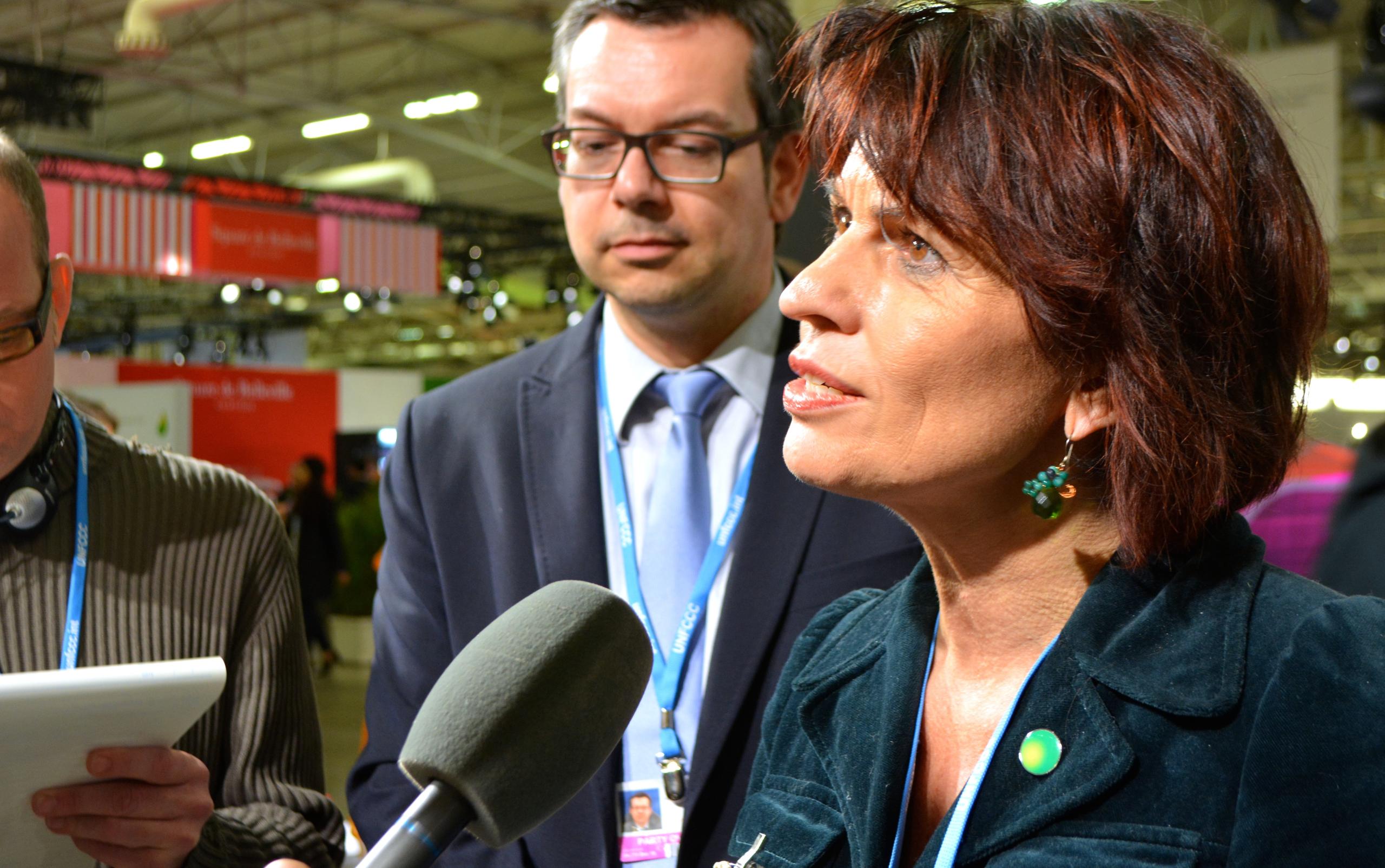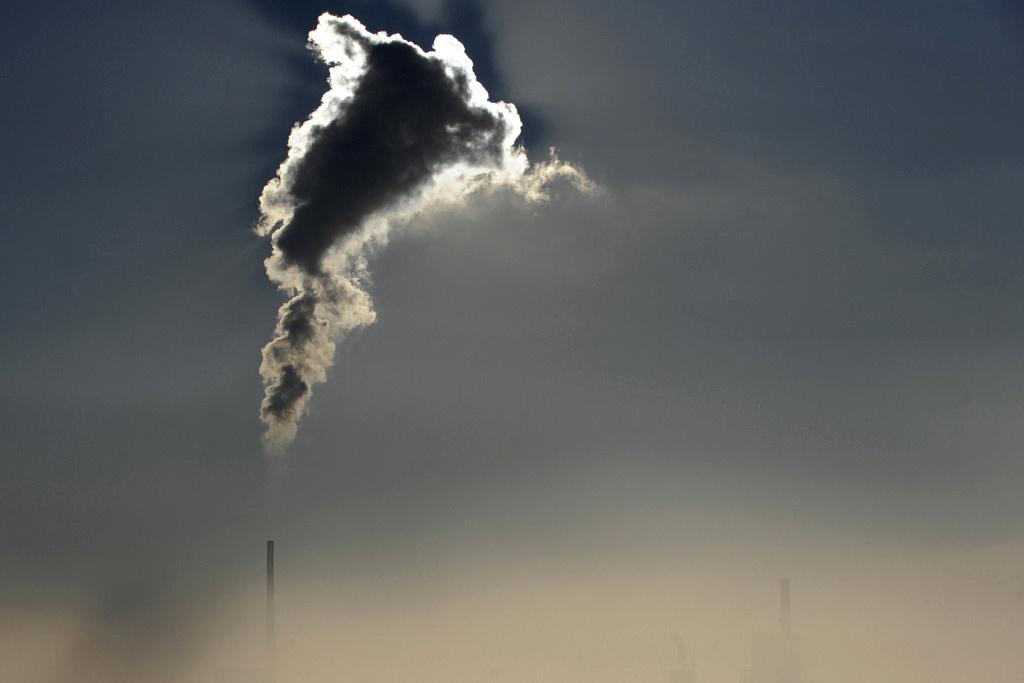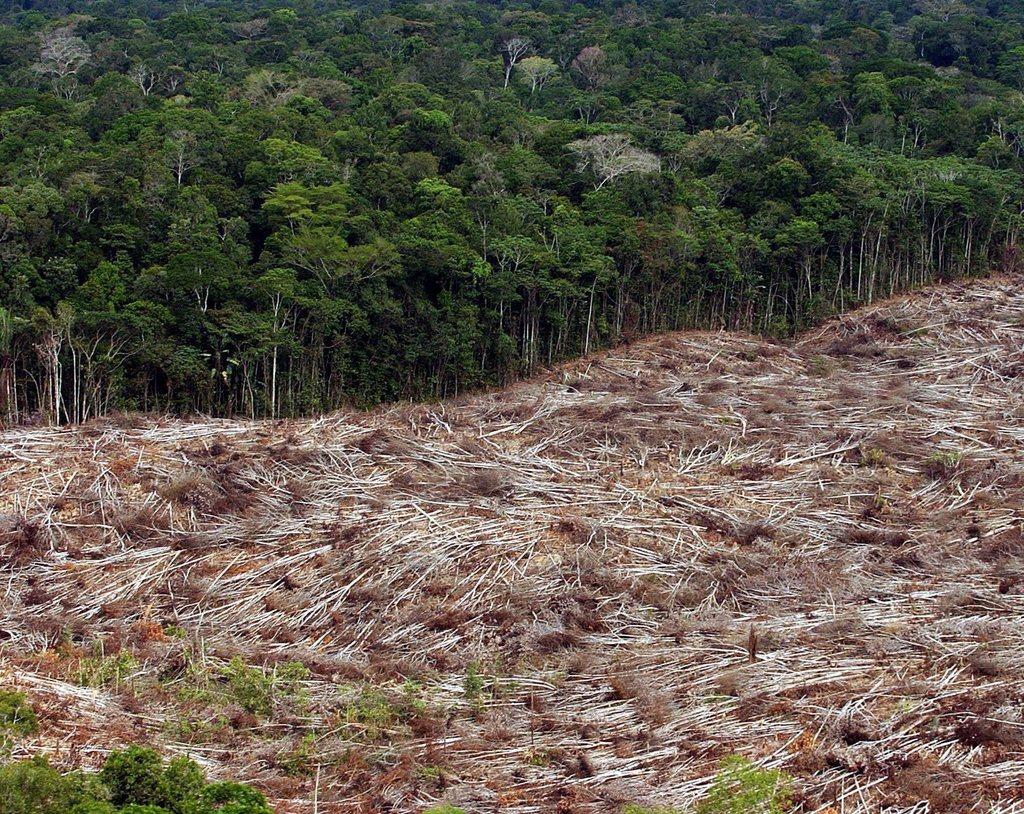
Climate treaty just a beginning, says Swiss minister

A historic climate treaty limiting global warming – adopted by over 190 countries in Paris on Saturday – marks the beginning of a longer process, says Swiss Environment Minister Doris Leuthard.
“We found a formula for working on the two degrees [Celsius temperature rise], but this is probably not the final goal,” Leuthard told swissinfo following the acceptance of the new Paris AgreementExternal link by the plenary at the climate summit, known as the COP21. “We didn’t find the final solution but rather the legal basis and mechanism, and now there is a dynamic that begins regarding the procedures and measures to take at home.”
A statement issued by the environment ministryExternal link said that “actions need to follow the words: national pledges need to be executed and verified, and emissions reduction efforts need to be regularly reinforced.”
The agreement, which replaces the 1997 Kyoto Protocol, will come into effect in 2020. It mentions the peaking of “global average temperature to well below two degrees Celsius above pre-industrial levels”, and pursuing efforts to limit that to 1.5 degrees Celsius.
Five-year reviews of national emissions plans are to be implemented and $100 billion annually in climate finance to be offered to developing countries by 2020, with a commitment for more finance in the future.

More
Graphics to guide you through the climate talks
Over the past week, Switzerland joined a group known as the High Ambition Coalition, which included more than 100 countries and was aimed at countering attempts by China, India and Saudi Arabia to water down various elements of the pact.
Leuthard said that the Swiss negotiating team had worked hard to reach a consensus, with developing countries often opposed to positions held by industrialised countries.
“There were groups which had strongly defended their positions. But we found an agreement, and that is fabulous.”
She explained how the tide in the talks had changed over the last few days, saying that “this week was a very emotional one”.
Loss and damage
One of the issues where Switzerland’s position differed from that of certain developing countries was on so-called loss and damage.
Switzerland, together with the United States, had been wary of any stipulation that would bind them to unlimited financial support to victims, in a world that is expected to be increasingly affected by the effects of climate change.
Low-lying island states in the Pacific Ocean, regrouped into the AOSIS group (Alliance of Small Island States), had argued that mention of loss and damage was particularly important, with many of them already experiencing flooding and even total immersion of their islands.

More
Paris deal ‘should mention climate migrants’
Leuthard commented: “I understand the concerns of the island inhabitants, and that they are concerned about their future, but it is difficult for us to say that we have a legal responsibility to what is happening there.”
“While it is a common responsibility, we will help countries to adapt and to reduce emissions.”
A statement issued by Fiji’s foreign ministry following the agreement’s adoption said, “It is encouraging that finally loss and damage is a standalone item even though work remains on finalising details in future [climate summits].”
NGOs react
Jürg Staudenmann of the NGO Alliance Sud applauded the adoption of the treaty as a “historic moment, a historic milestone for mankind”.
But he held that it was “just one step”, and that it was not as ambitious as his group had hoped to see regarding climate finance support to the poorest and most vulnerable populations in front-line countries, whom he said needed support “now and faster”.
He also said that at home, “Switzerland now needs to look at its books to change its carbon law. There is a clear mandate from the treaty.”
On the issue of loss and damage, Staudenmann said that he was “very glad that Switzerland came to support its reference”. However, the agreement did “not go far enough for the hundreds of millions of people who need to leave their lands” due to climate change.
The Swiss branch of the environmental group WWF, meanwhile, issued a communiqué qualifying the climate agreement as “clear progress, but not a breakthrough”.
Patrick Hofstetter, the organisation’s climate and energy specialist present at the summit, said that “The substance of the treaty was not enough to avoid climate change.”
The NGO said that the agreement still lacked clear signals for abandoning fossil fuel energies.
It said Switzerland could offer an example of how the world can adopt a policy that would keep temperature increase under 1.5 degrees. “This would mean the elaboration of a new CO2 law next year, for the reduction of 60% carbon emissions in Switzerland by 2030.”
Forest protection
Leuthard, who travelled back and forth between Paris and Bern this week due to ministerial elections, facilitated a negotiating group at the summit for the inclusion of the protection of forests in the agreement.

More
Deforestation: Are banks still taking a big cut?
“I am proud as we now have an article in the agreement which reinforces the multiple functions of forests –where they serve as a carbon capture mechanism, and have a commercial value with the use of certificates.”
But Alliance Sud’s Staudenmann noted that while forest preservation is important, greater emphasis is needed on reducing emissions generated from human activities. He said that it would never be possible to plant enough trees if carbon emissions are not drastically cut.
Message to the economy
When asked how the treaty will affect Swiss business, Leuthard told swissinfo.ch that “The financial sector has already began to take into consideration the price of carbon. It is a signal to the economy, when policy dictates that in the future we want to live without carbon and CO2. It is also a strong message to the economy and to society.”
The agreement, the minister said, would change public awareness of climate change and allow for the creation of new jobs in a greener world.
Switzerland was the first country this year to submit an INDC – intended nationally determined contribution – also known as an emissions reductions pledge.
But even on the last day of talks in Paris, the United Nations Conference on Climate Change (UNFCCC) continued to receive pledges from other countries, including from oil-producing Venezuela.
Earlier this month, Climate Action Tracker, representing a group of independent researchers, said that the effect of the INDCs that had been submitted by over 150 countries at the start of the Paris summit would still result in a 2.7 degree Celsius temperature rise.
Paris climate treaty: full text

In compliance with the JTI standards
More: SWI swissinfo.ch certified by the Journalism Trust Initiative
















![The four-metre-long painting "Sonntag der Bergbauern" [Sunday of the Mountain Farmers, 1923-24/26] had to be removed by a crane from the German Chancellery in Berlin for the exhibition in Bern.](https://www.swissinfo.ch/content/wp-content/uploads/sites/13/2025/12/01_Pressebild_KirchnerxKirchner.jpg?ver=cb688ed5)














You can find an overview of ongoing debates with our journalists here . Please join us!
If you want to start a conversation about a topic raised in this article or want to report factual errors, email us at english@swissinfo.ch.